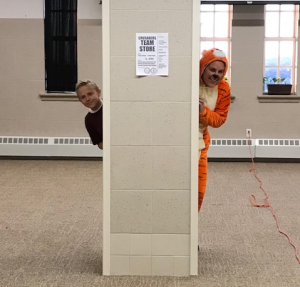You Reap What You Sow: Stories From the Front Lines
By Casey Ainsworth, MHS Middle Division Teacher
As a teacher, you have a lot of responsibility on your shoulders. You could probably place your face on the Atlas Statue because you’re definitely carrying the weight of the world.
When I categorize my responsibilities as a teacher, I have “job” responsibilities and “human” responsibilities. Obviously, lesson plans, professional development, and anything related to the day-to-day paperwork, I compile into the “job” category. These are the things I have to complete every day or I’d be looking for another profession. My to-do lists are typically filled with these “job” tasks, and as a teacher, I could show up every day, complete my to-do list, and leave my classroom knowing I did everything that was required of my “job.”
But for me, the job responsibilities are only 10 percent of my day. The other 90 percent is filled with the “human” responsibilities—motivating students, showing empathy towards situations a student may be going through, being an ear for a student, playing board games at lunch with students, and on and on. I can’t imagine going through each day like a robot, simply going through the motions.

Casey and one of her students during Halloween
Have you ever asked yourself, “Why did I decide to become a teacher?” For me, it’s because of the Mr. Nyes, Mrs. Millers, Mrs. Knutsens, Mr. Steelmans, Mrs. Grahams, Miss Schmoyers, Mrs. Connors, Mrs. Hilers, Mrs. Etters and Mrs. Currys of this world. Teachers who made an incredible impact on me as a student.
The funny thing is, it wasn’t anything specific they did every day, but the little things that made me feel like I mattered. They made me laugh, made me feel empathy towards others, and challenged me to be a better human being.
That’s what teaching is truly about. Caring about each student and knowing you are impacting youth, sometimes unintentionally.
Stories From the Front Lines
At our school’s graduation a few years ago, I ran into a graduate who was on our team in eighth grade. We caught up, had some good laughs, and exchanged phone numbers. I told her to reach out if she needed anything. Fast forward two years and I was invited to her college graduation. Although she loathes social studies and did as an eighth-grader, because of a seed that was planted almost nine years ago, I had the chance to watch her walk across the stage.
I also had a student who I had known for a long time prior to having her in class. One day we found out her grandmother had passed away. She was a kid who was always happy, or at least showed that. I noticed that when she returned to school after the funeral services, she was still the same happy, quiet kid. I kept her after class and asked how she was and she responded, “I’m fine, thank you.” I proceeded to tell her that everyone mourns in their own way, but it’s a necessary emotion to walk through. I told her to cry, be mad, be sad or whatever she needs to feel and that it’s okay to feel those emotions. She smiled and walked out of the room.
Later that school year, my grandmother passed away and upon my return to school, I had a few rough days. Not having truly mourned my Nanny, I was a little more on edge than normal. One afternoon, I returned to my classroom to find a note sitting on my desk. It read, “Miss A., just as you told me in the fall, don’t be afraid to cry, be mad, be sad or whatever you need to feel.”
It’s amazing the impact that we can have on our students, but also the impact our students can have on us.

